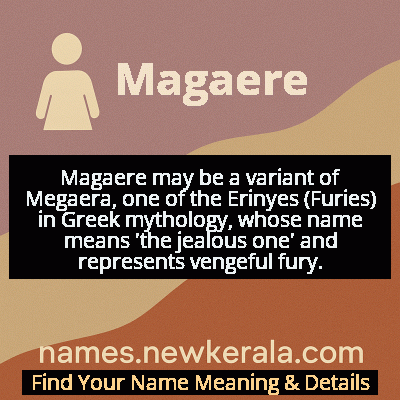Magaere Name Meaning & Details
Origin, Popularity, Numerology Analysis & Name Meaning of Magaere
Discover the origin, meaning, and cultural significance of the name MAGAERE. Delve into its historical roots and explore the lasting impact it has had on communities and traditions.
Name
Magaere
Gender
Female
Origin
Greek
Lucky Number
5
Meaning of the Name - Magaere
Magaere may be a variant of Megaera, one of the Erinyes (Furies) in Greek mythology, whose name means 'the jealous one' and represents vengeful fury.
Magaere - Complete Numerology Analysis
Your Numerology Number
Based on Pythagorean Numerology System
Ruling Planet
Mercury
Positive Nature
Adventurous, dynamic, curious, and social.
Negative Traits
Restless, impatient, inconsistent, prone to indulgence.
Lucky Colours
Green, white.
Lucky Days
Wednesday.
Lucky Stones
Emerald.
Harmony Numbers
1, 3, 9.
Best Suited Professions
Sales, marketing, travel, entertainment.
What People Like About You
Versatility, charisma, adventurous spirit.
Famous People Named Magaere
Magaere (Mythological)
Greek Fury/Erinyes
One of three primordial goddesses of vengeance who punished crimes against natural order
Magaere the Avenger
Literary Character
Featured in Aeschylus' 'Eumenides' as a relentless pursuer of justice
Magaere of the Underworld
Mythological Deity
Worshipped in some Greek cults as a protector of cosmic balance and punisher of oath-breakers
Name Variations & International Equivalents
Click on blue names to explore their detailed meanings. Gray names with will be available soon.
Cultural & Historical Significance
In classical literature, particularly in Aeschylus' Oresteia trilogy, Magaere appears as a formidable force of retribution who pursues Orestes for matricide, representing the conflict between ancient blood-feud justice and the newer Olympian legal system. Her transformation into a Eumenides (Kindly One) at the play's conclusion symbolizes Athens' transition from tribal vengeance to civic justice, making her a crucial figure in understanding the evolution of Western legal thought. Throughout Greek culture, the Erinyes were both feared and respected as necessary forces maintaining moral order, with Magaere representing the specific aspect of vengeance for personal betrayals and broken promises.
Extended Personality Analysis
Individuals named Magaere are often perceived as possessing intense, passionate personalities with strong moral convictions. They tend to be fiercely protective of those they care about and demonstrate remarkable loyalty, though this can manifest as jealousy when their relationships are threatened. Like their mythological namesake, Magaere-named individuals often exhibit a strong sense of justice and may become vocal advocates against perceived wrongs or injustices. They possess deep emotional intensity and can be quite persuasive when championing causes they believe in.
However, this passionate nature requires careful channeling, as it can sometimes lead to confrontational behavior when their principles are challenged. On the positive side, Magaere personalities often show tremendous resilience and determination, able to persevere through challenges that would deter others. They make formidable allies and dedicated friends, though their high standards and intense emotional nature can be overwhelming for more easygoing personalities. Their strength lies in their unwavering commitment to their values and their ability to fight tirelessly for what they believe is right, often serving as moral compasses in their social circles.
Modern Usage & Popularity
In contemporary times, Magaere remains an exceptionally rare given name, primarily used by parents with strong interests in classical mythology or those seeking unique, powerful names for their daughters. The name sees occasional usage in fantasy literature and gaming communities, where its mythological roots and strong, distinctive sound appeal to creators and fans of epic storytelling. While not appearing on mainstream baby name charts, Magaere has gained niche popularity among classical scholars, historical fiction enthusiasts, and parents looking for names that convey strength and individuality. The name's usage has seen a slight increase in recent years alongside growing interest in mythological and ancient names, though it remains far less common than its Latin variant Megaera. Modern bearers of the name often appreciate its historical depth and the powerful feminine archetype it represents, choosing it to honor strong, principled characteristics in their children.
Symbolic & Spiritual Meanings
Symbolically, Magaere represents the concept of righteous anger and the pursuit of justice through relentless determination. The name embodies the idea that some wrongs demand unwavering pursuit of retribution and that justice, while sometimes harsh, serves a necessary function in maintaining cosmic and social balance. Metaphorically, Magaere symbolizes the transformative power of anger when channeled constructively - the energy that fuels social change, personal boundaries, and the correction of injustices. In psychological terms, the name can represent the shadow aspect of the psyche that demands accountability and truth, refusing to let transgressions be forgotten or ignored. Magaere also symbolizes the ancient feminine principle of protective rage, the mother bear energy that emerges when loved ones or principles are threatened. The name carries the symbolic weight of ancient wisdom, reminding us that some forms of anger serve vital protective and corrective functions in both personal and societal contexts, representing the necessary force that maintains moral equilibrium.

